Precarious Yates's Blog: Precarious Precipices, page 8
July 15, 2013
Tamar’s Poem, and a chance to win a copy of UnEmbraceable
This is a portion of UnEmbraceable that I actually removed, because my helpful beta readers said it was too political and came out of nowhere.
The poem burst out of me while I was sitting in a Walmart parking lot, of all places, late on a Wednesday evening. It’s not my choice writing venue, but it worked out that night.
This was originally two-thirds of the way through the novel when Tamar begins to process her broken life on a deep level. It doesn’t give any spoilers, but rather tells about her life in foster care and as a runaway teen.
I don’t often get political, but when I learned how many kids in the foster care system are on major psychiatric drugs, and also that 95% of kids who are trafficked in America have been in the foster care system, something boiled inside of me.
If you would like to enter to win a paperback copy of UnEmbraceable, please leave a comment below. Winner will be selected at 7pm on Monday, July 15.

Available as an ebook or paperback.
Tamar
I spent many hours journaling with the stubs of pencils they allowed me to have. Thoughts spilled onto the page that I never considered were inside me.
I’m a child of America:
I’ve seen all its cities
Carried on the backs of greed.
I’m a child of America:
I’ve seen the worst motels
From sea to shining sea.
I’m a child of America:
Another one abandoned
By a government that thought it knew best
How to tame the beast of my own decisions
Inside its pills and foster care system
And yet another wrongful arrest.
I just want peace
In the land of the free
And the home of the brave.
But all you want is for me to behave
Like a good child of America.
One who will feed your greed
And still call you the best.


July 11, 2013
Sometimes It’s Better
This week the Lord brought me to a difficult epiphany.
I’d been working on a fantasy trilogy for eight years. During those eight years I had moved from one county to another within Ireland, then from Ireland to the east coast of USA, where I moved a few more times still, and then my husband, my daughter and I moved to Texas. In the midst of all that shuffle the major last scene of the book was lost.
You see, I insist on writing all of my first drafts out by hand. And this part never made its way into the computer.
And now it’s vanished.
But the Lord asked me to be thankful for that loss.
My first response was, “Okay, but I’m going to spend the next three hours searching before I do that.”
Again, I felt that gentle nudge in my heart: my King wanted me to me thankful for that loss.
I slumped into a pile of boxes and notebooks, willing myself not to cry, and asked for His help to see what I could be thankful for. Because I was blind to it.
Here’s what He showed me:
Notebooks I found were filled with notes for three more books, books He’d put on my heart to publish this year but I didn’t think I had enough material. Now I have the material.
There were a few scenes in that lost notebook that I wasn’t pleased with. This was my opportunity to make it entirely new, better and the way it should be.
I found prayer journals filled with desperate prayers that I now had the answer to.
Seeing these began an avalanche of gratitude. I’m thankful that even in loss there are things to be thankful for. And sometimes it’s better when you lose the bad writing so you can replace it with the good.

A reminder to myself to always say this.
“Give thanks in all circumstances.” 1 Thessalonians 5:18


July 8, 2013
Give Me Dove’s Eyes
How beautiful you are, my darling!
Oh, how beautiful!
Your eyes are doves.
Song of Solomon 1:15

Here He comes again, speaking tenderly, telling us before anything else that we are beautiful. We are His darling. We are so lovely that He says it in the poetic language of rapturous awe: Oh, how beautiful!
And it’s not because of what you’ve done with yourself, or how you’ve made yourself “look good” for God, but because He loves you and you simply said ‘yes’ to His love that He is undone by your beauty.
When He looks at you, your willingness toward Him, your beauty, is the first thing He sees and comments on.
It’s not the sin that you did yet again. It’s not the mess up that you made earlier. It’s how He made you to be lovely and the fact that you’ve said ‘yes’ to Him over and over: this is what He sees. Allow your heart to hear these words from Him:
How beautiful you are, my darling!
Oh, how beautiful!
What does this verse mean where it says “Your eyes are doves?”
First of all, the Holy Spirit came in the form of a dove. When God looks at you He sees the working of His Holy Spirit in your life.
Second of all, doves are only able to look at one thing at a time. They have a singleness of vision. They only focus on one thing.
I long to have dove-like eyes of my heart where all my focus, all my gaze is trained on the One.
“One thing I ask, O God, this is what I seek: that I may dwell in the house of the Lord all the days of my life, and that I may gaze upon Your beauty.” ~ Psalm 27:4
Let this be our prayer this week, this month, this year, this life:
Lord, please help me to fix my gaze upon you!
Misty Edwards has a beautiful song that talks about having Dove’s Eyes:


July 5, 2013
Letting Our Light Shine (link to full article)
Matthew 5:14 ”You are the light of the world. A town built on a hill cannot be hidden. 15 Neither do people light a lamp and put it under a bowl. Instead they put it on its stand, and it gives light to everyone in the house. 16 In the same way, let your light shine before others, that they may see your good deeds and glorify your Father in heaven.”
Jesus, who is the Light of the world, said these words in the Sermon on the Mount. He calls us lights even before we feel as if we’re lights. Time and again, in so many ways, He restores our dignity. His resurrection was the great restoration, bringing us up from the place of death to everlasting life with Him, from the place of shame to everlasting dignity and honor in Him. And what response would there be but to shine our light for Him before others?
But how do we shine?
Find the rest of the article here: http://www.1lightforgod.net/letting-our-light-shine/


July 3, 2013
Training Them to Lead
This happened a few weeks ago. It took me a while to process the whirlwind of emotions.
It was the most remarkable evening.
The day had been difficult, filled with lots of lashing out by a certain little 6 year old. Kicking. Throwing things. Yelling ‘no’ at everyone. All the things that make a parent cringe, cry, want to hide in a cave until the tantrums are over. One of those times where everyone in the universe looks at you kind of funny because, well, you’ve lost control of everything.
I had gotten so tired from correcting those behaviors that I decided to hug her instead. She still protested when I did that. Have you ever had an ‘I can’t win!’ day as a parent?
And then this happened:
“Mommy, I’m going to lead the lambs in all by myself.”
So she did. She walked over to our two little sheep and called in a quiet and gentle voice: “Leah, Rachel, come on girls.”
They followed her through the fence all the way into their sheep pen. She closed the sheep pen, turned around, and walked quietly back into the house.
Meanwhile, I stood, mouth agape, eyes wide open, in utter disbelief of what I’d just witnessed.
“Did I do a good job?” she asked as she passed me.
I nodded, so glad to have witnessed this turn around.
Sometimes it seems like all the efforts are in vain, but when the goal is training them to lead, they will do just that. Sometimes when you least expect it.
And now our little lambs follow her everywhere as she works on the farm.
I think she’ll be a CEO one day. In the meantime, I’ll just watch and learn.
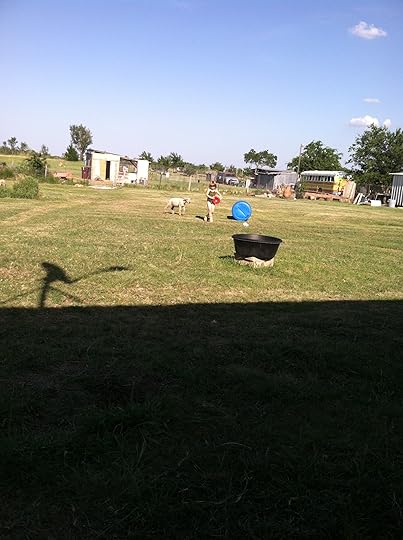
Rachel the lamb begins to follow her.

My sweet daughter is totally oblivious to Rachel.
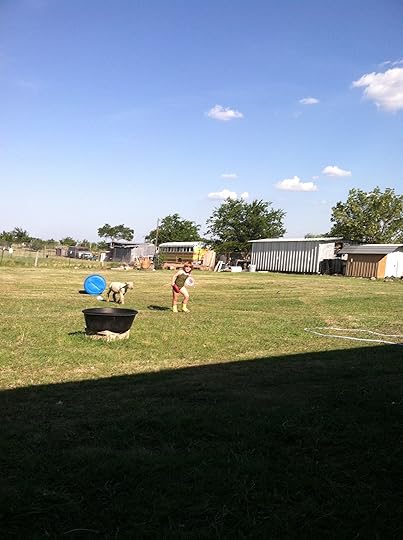
Then she gets the idea that someone might be following.

As a leader, her stride becomes bolder.

Rachel never stops following the confident leader.

My daughter explains to the lamb what she intends to do, which is to get water for the chickens.

And surely you can’t lead the lambs without preaching a little bit, right?
Sometimes it’s the little things that are the most remarkable.


June 30, 2013
Sheep Lesson #4: Lambs Love Kisses
This one surprised me!
Now that our lambs have gotten to know us, they will come right up to our faces and give us kisses!
Maybe it doesn’t seem like much, but kisses from a lamb do wondrous things to a shepherdess’s heart. It makes me wonder how much more it affects our Shepherd when His sheep ‘kiss’ Him with thankfulness and adoration.
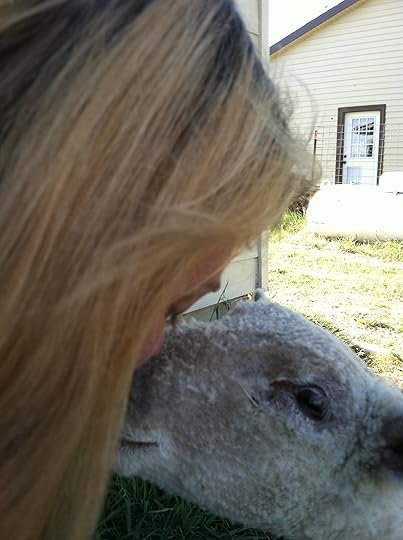
A kiss from Rachel. So sweet!
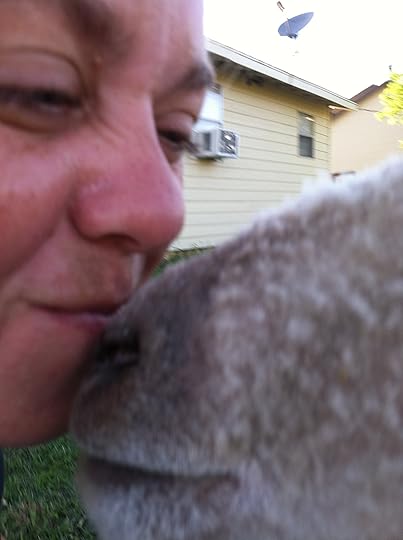
You’re a little stinky, Leah, but I’ll definitely kiss you!
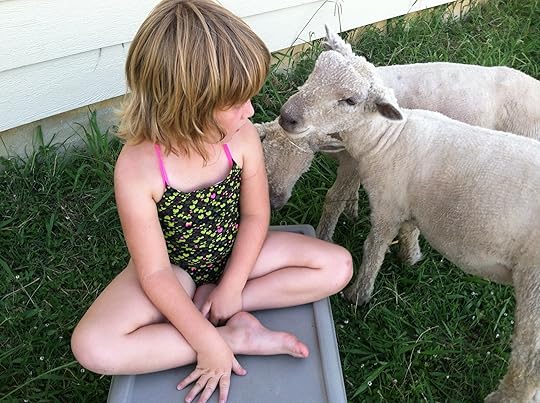
My darling girl gives them the most feed, and gets the most kisses.
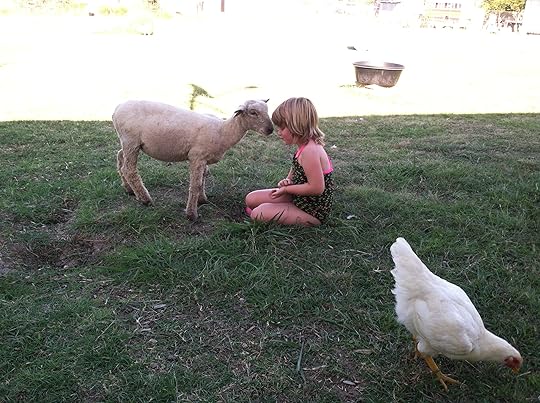
And my heart melts…
There is a secret to getting kisses–giving them “sweet” sheep feed pellets. It’s not sugary, but it is tasty like a treat to them. In other words, while the grass is their main nutrition, they are so pleased to receive the sweet along with the savory.
Our Lord also gives sweet words of love and encouragement along with any correction. That’s how I’ve grown to know His voice. And how I long to give Him ‘kisses’ of my worship!
Oh, and I did want to share that sheep really do follow a singing shepherd, and they get to know certain songs, as well as the voice of the singer.


June 27, 2013
Well, How Shall We Love?
This week, the Defense of Marriage Act (DOMA) was deemed unconstitutional and there were extreme reactions on both sides. Some of my friends were elated, some where horrified.
In March, I wrote a novel titled How Shall We Love?. It was a 5 year labor of love with characters who challenged me, infuriated me and dredged up memories that needed daylight and healing. In the novel we learn that one of the characters is homosexual, and for fear of what loved ones say and think, this character is driven into reactionary isolation even while achieving worldwide fame. There is a reason I chose to make this character so broken.
And it’s this reaction, the fear this character had, that drove me to write what I did. There is so much fear on both sides of this ideology fence, this crazy 10 lane highway where on one side there is the homosexual community and on the other side there is the evangelical/charismatic Christian community.
Let’s look straight at one of the divisive verses before we move on. From Romans 1 we read:
Their women exchanged natural intercourse for unnatural, and in the same way also the men, giving up natural intercourse with women, were consumed with passion for one another. Men committed shameless acts with men and received in their own persons the due penalty for their error.
That’s a hard passage for some people to even read through, never mind study. Some either blame Paul or chalk it up to ancient ways of thinking.
Before I’m finished there may be many on both sides of the crazy 10 lane highway who will be incensed, but hear me out.
The same Paul who wrote that statement also wrote 1 Corinthians 13:
Love is patient, love is kind. It does not envy, it does not boast, it is not proud. It does not dishonor others, it is not self-seeking, it is not easily angered, it keeps no record of wrongs. Love does not delight in evil but rejoices with the truth. It always protects, always trusts, always hopes, always perseveres.
Love never fails.
I have personally witnessed people who have treated the first passage from Romans as a reason to nullify the second passage from 1 Corinthians. In other words, the conclusion is drawn that if someone is homosexual there’s no need to love them with a patient, kind, honoring and never failing love. I’m here to say to myself and to everyone that there is no such loophole. There is no loophole. There is no excuse to not show love as spelled out in 1 Corinthians 13. None.
So, how shall we, in the evangelical/charismatic community, love? And I’m talking 1 Corinthians 13 love, not the the ‘telling the truth in love’ sort. Some of us have been ‘ordered’, in a way, to ‘tell the truth in love’. As a song I’ve heard recently pointed out, there’s a big difference between following orders and showing genuine love. (Look up “Glass Houses” by The Classic Crime.)
Here are ways to love:
Do you have someone in your family who is homosexual? Does this person already know where you stand? Practice kindness and honor. To love means to realize the potential in another person and draw that potential out. Can this be done without constantly treading all over the hot button issues? Yes.
Stop insulting homosexuals behind closed doors. Yes, I did just put that in the imperative because I’m so sick and tired of hearing it! Do you think homosexuality is wrong? Well, stop making fun of it. And stop making fun of the people who don’t think it’s wrong. That sort of jesting and joking is NEVER an expression of love. Ever. I’m so imperative because this always hurts everyone involved: the speakers, the hearers and those who the jesting is toward.
Can you befriend someone different from you? Can you take them out for coffee and listen to their dreams and visions for life?
For those who are homosexual or in strong support of gay marriage, how can you love those in the evangelical/charismatic community?
Can I make some suggestions?
Please don’t automatically think someone hates you just because that person is an evangelical/charismatic Christian. This could be one of those really cool ‘agree to disagree’ opportunities, and the bridge could be one of the most beautiful, ornate things you’ve ever helped to build.
Wrong or offensive words might be said, but that can happen in any relationship. Please be patient.
Stop making fun of evangelical/charismatic Christians, because that isn’t helping. Trust me. It goes both ways.
Can you befriend someone different from you? Can you take them out for coffee and listen to their dreams and visions for life?
We could get out of the cars on that crazy 10 lane highway and stop trying to run each other over. And while we’re out of those cars, we could listen to one another. It just might steer things from total disaster.
All day today, I had a verse from 1 Peter running through my mind:
“For it is better, if it is God’s will, to suffer for doing good than for doing evil.”
As for me and my house, we shall serve the Lord, who is love (see 1 John 4).
For those interested in my novel, here’s the link:
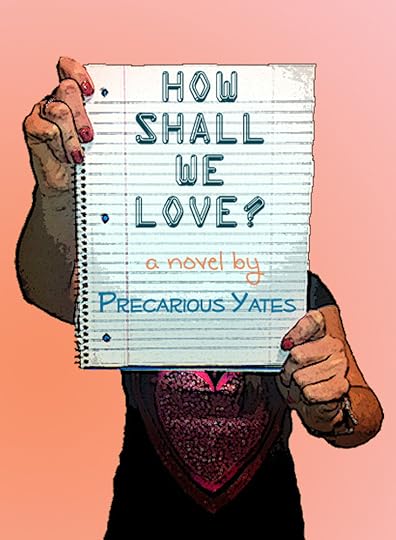


Recipe – West African Ground Nut Stew
Here’s a recipe for my gluten-free and vegetarian friends, and for those who like good, exotic food:
West African Groundnut Stew
Ingredients:
3 sweet potatoes, peeled and chopped into 1 inch chunks
2 Tbsp olive oil
1 large onion, chopped
1 large eggplant or aubergine chopped into 1 inch chunks
1 can (14 oz) chopped tomatoes, or 2 cups fresh chopped tomatoes
2 Tbsp minced fresh ginger
1 pinch of nutmeg
2 cups peanut butter or almond butter (crunchy or creamy is totally up to you)
6-7 cups vegetable or chicken broth
1-2 cups of any of the following veggies (chopped): broccoli, carrots, peas, zucchini (courgettes), yellow squash, green beans, corn, cauliflower, bell peppers, spinach, collards and beet greens
For those who like spice, add some cayenne! Yum!
Salt/Pepper to taste
2 cups cooked brown rice
Method:
In a large, thick bottom stew pot, heat oil. Saute onions. Add ginger.
When onions become translucent, add broth, slowly so you don’t splash hot oil on yourself.
Add sweet potatoes and, if you’re using them, carrots.
Bring to a boil and add salt, pepper, cayenne (if you’re using it) and the pinch of nutmeg.
After the stew has boiled for 7-10 minutes, add tomatoes, eggplant (aubergine), any squash, peppers, peas, green beans, corn and collards. If you’re using spinach or beet greens, wait until later to add those.
Add the peanut butter and stir until mixed in. It will look strange for a few minutes, but it looks beautiful after 10 minutes or so. Bring to a boil and then simmer for 10 minutes.
If you’re using spinach or beet greens, add those at this time.
Simmer for 2-3 more minutes.
Serve over cooked brown rice.
This dish is really good with iced jasmine green tea.


June 25, 2013
Diving Past Awkwardness into the Divine
Song of Solomon 1:13 My beloved is to me a sachet of myrrh
resting between my breasts.
14 My beloved is to me a cluster of henna blossoms
from the vineyards of En Gedi.
Okay! Let’s jump right into the awkwardness. It’s a bit awkward for some people when the Bible starts talking about breasts. Some are like, whoa! Others may have the what??? reaction that I did at first.
The Song of Solomon is beautiful poetry celebrating marital bliss and can be interpreted as an allegory of the relationship between Christ and the church. Sometimes when it hits verses like 1:13 people give sideways glances and look for the exit.
Stay with me! I promise it’ll be worth it!
First, let me unpack some of the symbolism.
When interpreting the Song of Solomon as a love song between Christ and the church, all of the symbols connect to other uses of the symbols throughout the Old and New Testaments.
The breasts are a picture of the breastplate as depicted in the following verse from 1 Thessalonians:
5:8 But since we belong to the day, let us be sober, putting on faith and love as a breastplate, and the hope of salvation as a helmet.
So we see that the poetic symbols represent FAITH and LOVE.
Myrrh was used as an embalming spice and in scripture it often speaks of suffering and death.
Let’s look at this first verse with these symbols in mind:
I hold the death of my Beloved Jesus, that awful death on the cross, close to my heart, nestled in the depths of my faith and love, and I meditate on all that He did for me.
In the next verse we have henna. Henna is a scratchy dessert brush that has fragrant blooms, but what henna is most known for its the red dye that stains the skin and can be painted into beautiful designs. Red like the scarlet cord that hung from Rahab’s window (see Joshua 2:18). Red like the blood that washes away all our sin.
This henna is growing in the vineyards of En Gedi. En Gedi is an oasis in a desert region in southern Israel, so the idea of vineyards and beautiful henna blossoms there gives hint of God’s promise about there being blooms in the desert. The name of the town can be translated as The Spring of the Young Goat.
Huh?
Can we do anything with that?
Do you remember how, on Yom Kippur, the Day of Atonement, the priest would lay hands on two goats. One goat he would slaughter, the other he would send out into the desert. And that young goat who “bore the sins”, where would it go but toward water?
Jesus is the Yom Kippur sacrifice, and the “Scapegoat” who bore our sins. He is fragrant and beautiful. He is my best thought, my sweetest meditation.


June 23, 2013
God Is Still Good When…
…everything fails.
Habakkuk 3:17 Though the fig tree does not bud
and there are no grapes on the vines,
though the olive crop fails
and the fields produce no food,
though there are no sheep in the pen
and no cattle in the stalls…
This may be more personal than I intend, but here goes.
In March I planted a huge garden along with 150 lbs of potatoes. That 150 lbs isn’t the expected yield, only what was planted. The expected yield is 3-5 times that amount, if not more.
I also planted rows of green beans, squash, collard greens, onions, lettuce and tomatoes. Again, I planted enough to feed our family and at least one or two other families.
And we have 12 hens. That should mean a dozen eggs a day, right?
But all of it has failed all at once. Most of my onions, many of the potatoes, all the tomatoes and squash have all failed to bear fruit. And my hens have stopped laying. Almost all of them at once. Also, we lost quite a few chickens in rather rapid succession (most of them from violent means).
My garden didn’t go neglected. I watered, hoed, chased rabbits away from my collards and lettuce, I worked until I was delirious from sweat and heat. I have enough to feed my family, but no more than that.
I’ve sold a total of 2 book in the last 30 days. That’s less than I sold when I wasn’t marketing.
We make enough to meet our bills, but no more than that.
When I was a little girl, my dad told me that one of the secrets to getting rich is to make sure to tithe. I’ve learned what he meant by this. I probably could make an easy million without tithing, but would I really want to? No.
I remember how God said in Malachi 3:10 to test Him about tithing to see if He would not pour out blessing.
He still will.
I keep reminding myself that the story isn’t finished.
But even in this middle part, even when everything seems to be failing, when all my lack of success is displayed in glaring Amazon numbers, when all my tomato plants die and my kale was eaten by some greedy bunny, even then God is good.
Habakkuk 3:17 Though the fig tree does not bud
and there are no grapes on the vines,
though the olive crop fails
and the fields produce no food,
though there are no sheep in the pen
and no cattle in the stalls
18 yet I will rejoice in the Lord,
I will be joyful in God my Savior.
One of my heroes in the Bible is a quiet farmer from Bethlehem named Boaz. You can read all about him in the very short book called Ruth. Boaz maintained his farm throughout a famine, and that farm prospered after the famine. He had enough resources to support his family and have numerous farmhands. Not only that, he gave generously out of his bounty.
Boaz was no miser. When he had a harvest party, the wine tended to flow liberally. He was a righteous man who blessed (with word and deed) everyone around him. I want to be like that. I want to not only take care of my immediate family, but have enough to take care of others as well.
My story’s not over yet, and God may still open the windows of blessing over my life, but right now, when everything seems to be failing at the same time, God is still good.
Have you ever experienced a time where everything seemed to fail all at once? What happened next? (Yes, I am fishing for encouragement. And maybe your story will bless someone else beyond me as well.)


Precarious Precipices
- Precarious Yates's profile
- 40 followers



